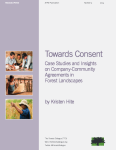A report published by The Forests Dialogue (TFD) in collaboration with the World Bank's Program on Forests (PROFOR) gathers case studies from around the world illustrating how private companies are working with local communities to obtain their Fair, Prior and Informed Consent (FPIC) for investments in forest landscapes.
 5 October 2015: A report published by The Forests Dialogue (TFD) in collaboration with the World Bank’s Program on Forests (PROFOR) gathers case studies from around the world illustrating how private companies are working with local communities to obtain their Fair, Prior and Informed Consent (FPIC) for investments in forest landscapes.
5 October 2015: A report published by The Forests Dialogue (TFD) in collaboration with the World Bank’s Program on Forests (PROFOR) gathers case studies from around the world illustrating how private companies are working with local communities to obtain their Fair, Prior and Informed Consent (FPIC) for investments in forest landscapes.
Titled ‘Towards Consent: Case Studies and Insights on Company-Community Agreements in Forest Landscapes,’ the publication explores some of the strategies adopted by companies to address the challenges of adhering to FPIC principles, especially in situations where tenure regimes are still evolving and where statutory law and customary rights conflict.
The report features a pilot eucalyptus plantation and agroforestry project implemented by Stora Enso in Laos, where the multinational opted to elicit the participation of community members in co-managing a Village Development Fund to compensate villagers and improve their livelihoods. The report notes that, while the corporation was not legally required to do so, it “…ultimately concluded that the benefits of working with communities … greatly outweighed the costs by significantly reducing the risk of conflict.”
The report also highlights similar experiences in Indonesia, South Africa and Uruguay, where companies have introduced a range of strategies to achieve FPIC, including third party mediation and participatory mapping to manage conflict, or “tiered negotiations” to engage stakeholders based on different tenure situations. It notes that one of the key insights gained is that benefit-sharing arrangements become increasingly important where communities lack state-recognized rights to forest resources and can “provide social license to operate in situations where statutory laws conflict with customary rights.”
The report cautions, however, that building meaningful stakeholder engagement requires “thoughtful engagement.” It recommends, inter alia: incorporating grievance mechanisms and community development funds to ensure that all participants share in the benefits; undertaking an early social impact assessment to identify all the relevant stakeholders and cultural, social and economic factors that could influence the agreement; sharing information in a variety of languages and formats, including building capacity for genuinely collaborative partnerships; putting in place alternative arrangements to accommodate all parties involved should stakeholder consent be revoked or denied; and involving outside experts and government officials as third-party negotiators and in resolving disputes. [TFD announcement] [PROFOR Overview: Getting to ‘Yes’ in Company-Community Agreements for Forests] [Publication: Towards Consent: Case Studies and Insights on Company-Community Agreements in Forest Landscapes]